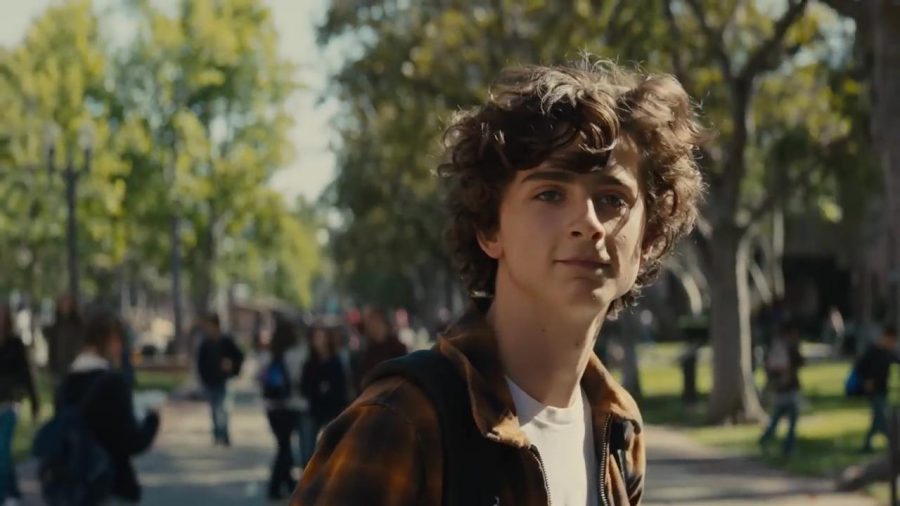As we dive deeper into the brisk month of October, we begin to see the signs of Oscar season creep toward us — awards buzz fills our minds and screens. One of these films garnering significant attention is the rehab drama “Beautiful Boy,” starring Academy Award-nominated actors Steve Carell and Timothée Chalamet.
The film is based on two autobiographies, “Beautiful Boy” by David Sheff and “Tweak: Growing Up on Methamphetamines” by Nic Sheff, who are real life father and son, respectively. The story specifically follows David (Carell) desperately trying to save Nic (Chalamet) from the uncontrollable crystal meth addiction that has absorbed his life.
The screenplay, co-written by “Lion” screenwriter Luke Davies and director Felix Van Groeningen, follows a distinct pattern: Nic goes from using drugs, to wake up calls, to rehab, to bouts of relapses. This cyclical plot portrays the repetitive and all-consuming nature of drug dependence. By omitting the start and end of Nic’s addiction, the film depicts a never-ending loop that is impossible to escape.
The father role in the movie spotlights another vital aspect of addiction — how the destructive cycle impacts an addict’s family. There is an especially stirring scene, partially seen in the film’s trailer, in which Nic asks David for money after being sober for a few days. A heartbroken David refuses, seeing Nic’s obvious jittery ticks and lack of recovery, and pleads with Nic to come to an upcoming family event. Nic refuses David; and their escalating argument depicting the struggles family members go through to support addicts as well as the anxiety and insecurities that prohibit recovery. The scene is short but a slow burn where it feels like the characters are dancing on a withered tightrope and Nic could fall into a hole of addiction at any moment before David catches him.
However, this is one of a few memorable scenes between the actors. Overall their relationship is very one dimensional. Davies and Groeningen approach the characters and subject matter with extreme caution, which at times robs it of depth. What could have been a complex, deep-rooted examination of addiction ends up being an underwhelming, surface-level engagement with performances that transcend a weak script.
By not exploring the characters thoroughly, David and Nic’s interactions are entertaining because of the strong performances, but do not always feel authentic. As a result, it is difficult to invest in their relationship. While films like “Requiem for a Dream” or “Half Nelson” are unwavering in their depiction of protagonists — the final 20 minutes of “Requiem” are especially gut-wrenching for its fast paced downfall of its ensemble cast — ”Beautiful Boy” feels like it resorts to cheap sentimentality to tug on heartstrings. Groeningen seems to be walking on eggshells when it comes to heavier topics and is reluctant to dig deep.
“Beautiful Boy” does surprise in terms of its stunning technical aspects: the landscapes shots throughout are beautiful and serve as an interesting contrast to the somber subject matter. Still, these peripheral shots do little to develop the movie’s main players. This intense focus on the surrounding world rather than the character themselves is fitting as it embodies the film’s lack of intimacy. It never takes the leap into exploring the essence of each individual, which leaves the audience isolated — it puts a wall between the personal narrative and the audience’s sympathy.
The true standout in this film is Chalamet, who not only physically captures the toll of meth addiction, but also the deep emotional trauma. His success during serious, intense scenes with Carell call attention to his unique ability to hold and captivate an audience even while performing a mediocre script. Carell, who earlier shined in dramas like “Foxcatcher” and “The Big Short,” has finally cemented a new phase of his career — he will be soon be seen in Adam McKay’s Dick Cheney biopic “Vice” as Donald Rumsfeld — of Oscar-potential dramas. While Chalamet is quite showy, Carell is far more understated, carrying the weight of a frustrated but caring father.
“Beautiful Boy” could have been an outstanding movie, especially with its real-life inspiration and the star talent it recruited. However, with Groeningen’s surface-level handling of the source material, the film leaves much to be desired and fails to rise from good to exceptional.
“Beautiful Boy” opened in New York theaters on Friday, Oct. 12.
A version of this article appeared in the Monday, Oct. 15 print edition. Email Kaylee DeFreitas at [email protected].
















































































































































